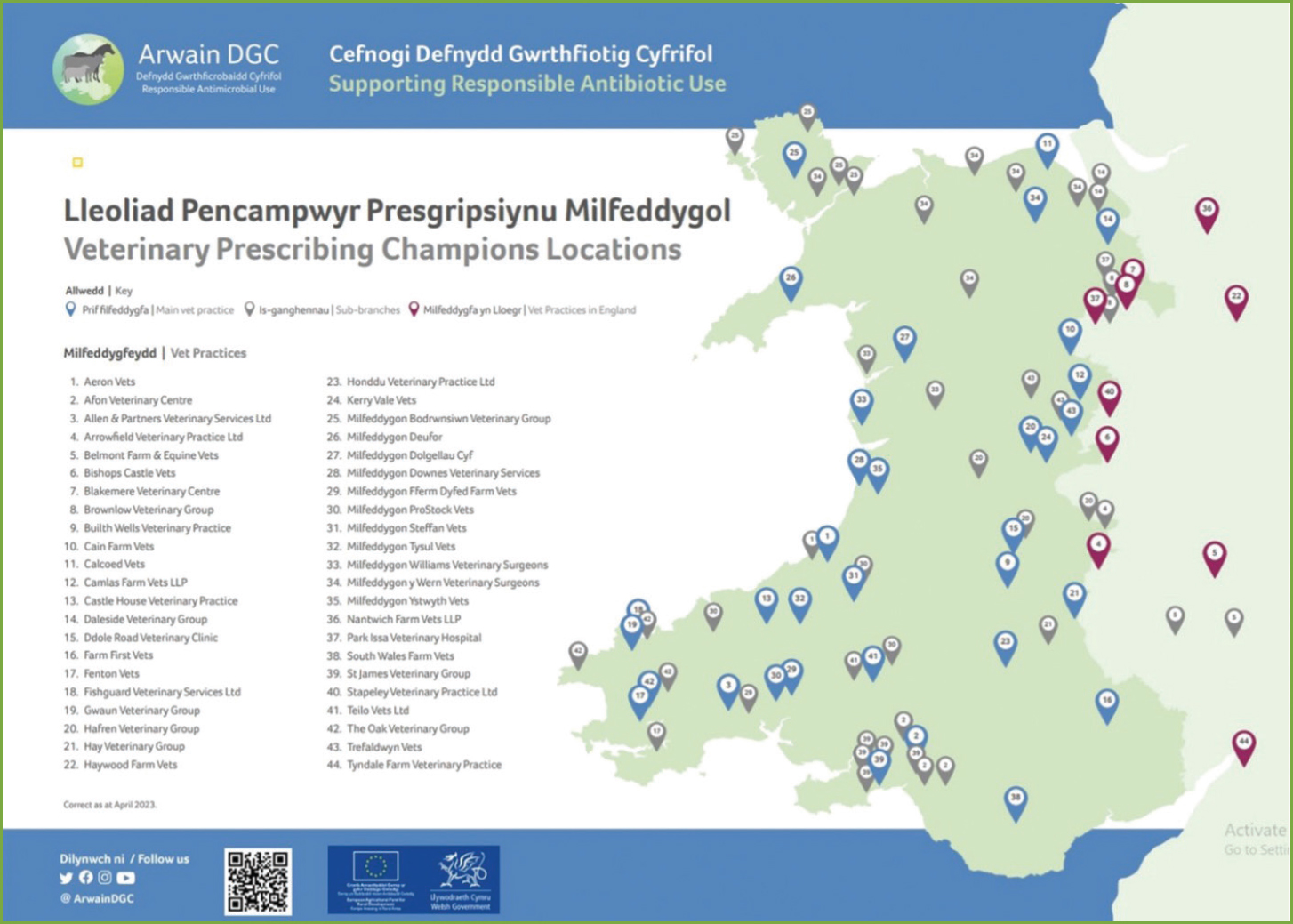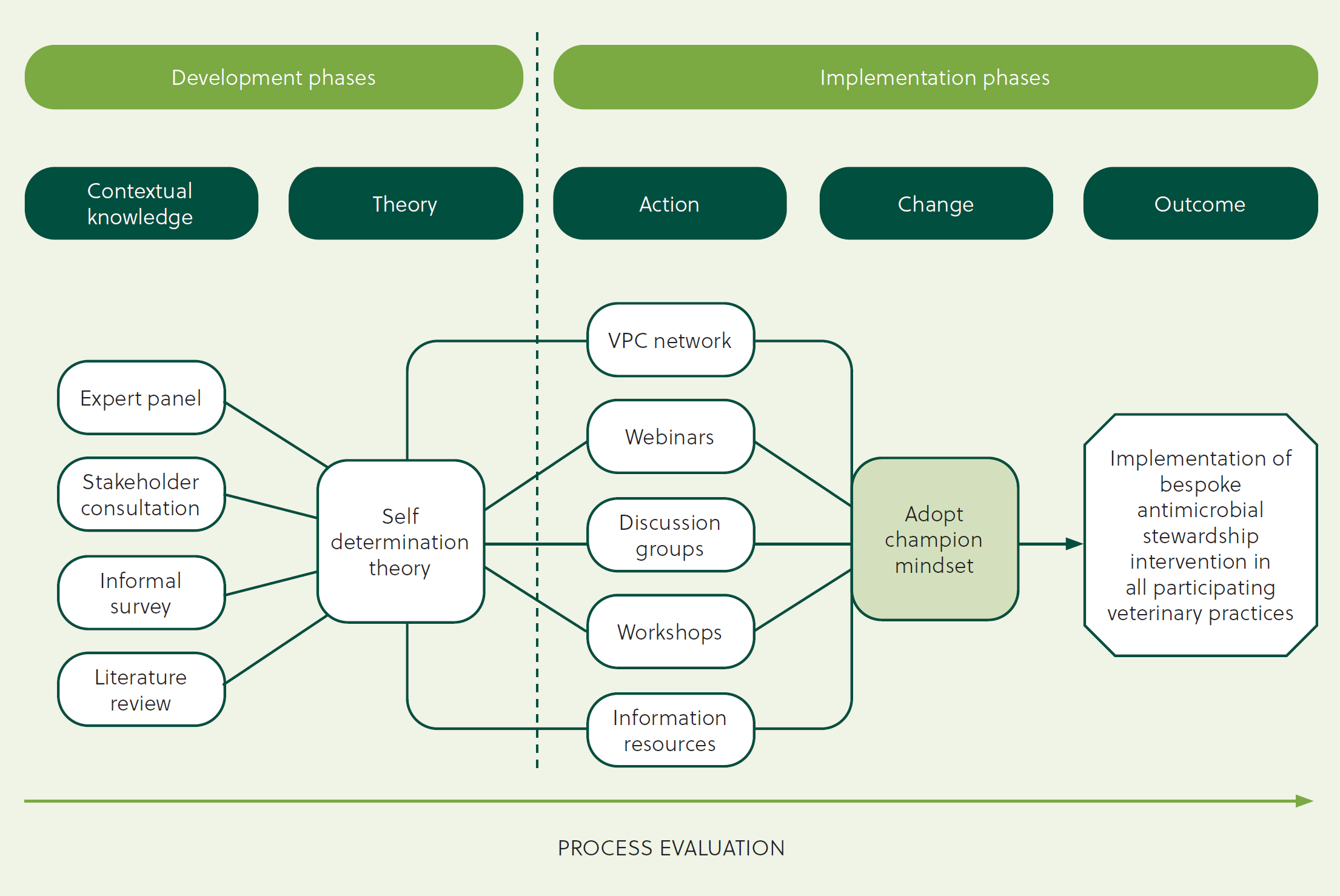Encouraging and supporting farm animal vets to prescribe antimicrobials responsibly is a shared global goal and one that has engendered many different approaches from strict legislative and regulatory control to voluntary initiatives. This article outlines the approach taken in Wales via the Arwain DGC project and the establishment of the Veterinary Prescribing Champions Network.
The Welsh Government is advised by an Animal and Environment Antimicrobial Resistance Delivery Group. This advisory group developed the Antimicrobial Resistance in Animals and the Environment Five Year Implementation Plan for Wales 2019–2024 (2019) with the Office of the Chief Veterinary Officer (OCVO), which was actively seeking ways to support Welsh vets to lead the way on responsible antimicrobial use.
Iechyd Da, the Animal and Plant Health Agency's regional veterinary delivery partners for South Wales, had been considering ways of bringing their practices together to improve veterinary prescribing and to tackle perceived issues of farmers sourcing medicines from multiple practices in the region. Iechyd Da and the OCVO approached Professor Kristen Reyher and Dr Gwen Rees at the University of Bristol's antimicrobial resistance research group (AMR Force) to discuss how best to design an intervention that addressed these issues.
A new approach to responsible antimicrobial use was developed. Wales would establish a national Veterinary Prescribing Champions Network to harmonise the approach to prescribing and treatment. The vision was that a new community of shared practice would develop that would enable peer learning, participatory development of stewardship interventions and bring together vets from practices across Wales.
This initial work evolved into the substantial Arwain DGC project (Arwain meaning lead) that now encompasses many different approaches to tackling antimicrobial use in Wales. Multiple workstreams focussed on collecting and analysing data on antimicrobial use, cutting edge research into transmission and surveillance of antimicrobial resistance, precision technologies and disease surveillance, as well as others.
The project is led by Menter a Busnes in collaboration with partners Iechyd Da, Welsh Lamb and Beef Producers, the University of Bristol and Aberystwyth University.
By bringing together these five partners, Arwain DGC has been able to help the Welsh government deliver on the aims of the current Antimicrobial Resistance in Animals and the Environment Five Year Implementation Plan for Wales 2019–2024 and establish a blueprint for approaching animal health challenges.


A network of prescribing champions
Every practice offering farm animal services was identified through the veterinary delivery partners and invited to nominate one vet to represent their practice on the network. That vet would also act as the network's representative within the practice and take on the role of practice prescribing lead. Practices were encouraged to nominate experienced vets in senior positions so that those vets had the autonomy within the practice to make changes to prescribing. Around 90% of practices offering farm animal services in Wales enrolled on the project and more practices are being actively recruited. The goal is that 100% of farm animal practices in Wales will join this voluntary initiative.
One of the notable things about the Veterinary Prescribing Champions Network and its successes so far is its foundation in the theory of human behaviour and complex interventions. The network has not worked by accident; the concept, design and implementation of the work of the network has been closely tied to the literature about how to develop communities of practice and how to implement complex interventions, while supporting people's intrinsic motivations for change (Rees et al, 2021).
The vets are offered a thorough programme of regular discussion groups, advanced training in prescribing and related disciplines, and participatory workshops and events. They are asked to develop and implement at least one bespoke antimicrobial stewardship intervention within their practice. There are around 100 stewardship interventions currently being enacted in practices across Wales.
A key message from our early work with the network was that the Veterinary Prescribing Champions wanted to take back some control over prescribing within Wales, and to develop their own voluntary Code of Conduct for practices within the network. As one vet pointed out, ‘what's the point of all our hard work if anyone can say they're in the network but not actually change their prescribing?’
Code of Conduct
The Veterinary Prescribing Champions expressed concerns that farm clients were obtaining veterinary medicines from more than one source. They suggested this led to vets’ ambivalence about reducing antimicrobial use, because there was a perceived risk that a farmer would take their medicine custom elsewhere. The practice of buying medicines from more than one source also creates difficulty for vets in knowing how antimicrobials are really being used on farms. The Veterinary Prescribing Champions hoped their own voluntary Code of Conduct for prescribing across the network would drive positive change and signpost farmers to the practices that prescribe responsibly. A working group was established: six vets that met regularly over the course of a year to review the available legislation and guidance around veterinary medicine prescribing to develop an agreed Code of Conduct for Welsh veterinary practices to sign up to.
The development of the code occurred concurrently with the Royal College of Veterinary Surgeons consulting on and developing its ‘under care’ guidance on prescribing prescrip-tion-only veterinary medicines, and it was difficult to predict how the two would compare. Many of the tenets of the Arwain DGC Code of Conduct align with the new Royal College of Veterinary Surgeons ‘under care’ guidance, but there were areas where the Veterinary Prescribing Champions felt they wanted to go a step further:
- The code requires a practice to identify itself as a ‘core prescribing practice’ for a farm before prescribing. That practice will have regular in-person reviews with the farm and will have at least one vet with in-depth knowledge of the animal health on the farm. This core prescribing practice must provide 24/7 emergency cover and will generally be the only practice that can prescribe to the farm.
- There is an agreed working definition of ‘under care’, which states that nothing can be prescribed to animals on a farm unless the prescribing vet is at the recognised core prescribing practice, or unless a formal agreement with full record sharing is made between the core prescribing practice and the prescribing vet.
- There is an agreed working definition of ‘responsible use’, emphasising the need for sufficient clinical information to be available before prescribing can take place.
- The code acknowledges that a holistic approach to disease must be used, encompassing preventive medicine, client engagement, medicine and disease reviews, audits and reporting on failure of treatment.
All veterinary practices within the Veterinary Prescribing Champions Network are asked to display their signed Code of Conduct poster in the practice's reception area, to signpost clients to the practice's commitment to responsible medicine use.
Arwain clinical guidelines
In addition to the voluntary Code of Conduct, the Veterinary Prescribing Champions Network has developed a series of clinical guidelines for six diseases of cattle and sheep:
- Sheep
- Watery mouth (Escherichia coli enterotoxaemia)
- Joint ill (neonatal polyarthritis)
- Lameness (scald, digital dermatitis, contagious ovine digital dermatitis).
- Cattle
- Bovine respiratory disease in calves
- Neonatal diarrhoea
- Mastitis – selective dry cow therapy.
Academics at Aberystwyth University conducted a thorough literature review for each disease and presented these reviews to the network. A working group was selected to develop the guidelines. Over the course of 12 months they met several times to consider the evidence, and to use their experience and expertise to design treatment guidelines for these diseases. The clinical guidelines cover disease aetiology, risk factors, disease prevention, diagnosis and treatment. The guidelines are set out in a range of resources for practices, vets and farms.
Practice resources
- Clinical guidelines: in-depth booklets intended to sit within the veterinary practice as a reference for vets that need to know the detail of each disease.
- Supporting guidance: online supporting documents containing the full literature reviews for vets wishing to further explore the evidence-base behind their decision making.
Vet resources
- Disease digest quick-reference guides: these are distributed on never-tear paper to be kept in a vet's car as a practical aide memoire on the best approach to each disease. The guides briefly cover the key points, which are described in more detail in the clinical guidelines.
Farm resources
- Point planners: the vet will sit with the farmer during their animal health review and complete this bespoke planner for each disease, outlining a farm's specific risk factors, mitigating actions, diagnostic testing and management changes.
- Treatment planners: intended to be completed by the vet and farmer for each disease, specifically for that farm and displayed prominently for all farm staff.
The first iteration of the Code of Conduct and Clinical Guidelines were sent to practices in late Summer 2023. Arwain DGC is now supporting vets to disseminate them and inviting feedback on ways that these resources can be improved and extended, as Wales strives to lead the way on responsible antimicrobial use.


